| Listing 1 - 10 of 11 | << page >> |
Sort by
|
Book
Year: 1995 Publisher: Princeton Princeton University Press
Abstract | Keywords | Export | Availability | Bookmark
 Loading...
Loading...Choose an application
- Reference Manager
- EndNote
- RefWorks (Direct export to RefWorks)
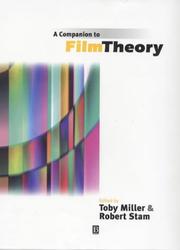
ISBN: 0631206442 9780631206446 9780470998410 0470998415 9781405165488 1405165480 9780470998403 0470998407 Year: 2004 Volume: 1 Publisher: Oxford Blackwell
Abstract | Keywords | Export | Availability | Bookmark
 Loading...
Loading...Choose an application
- Reference Manager
- EndNote
- RefWorks (Direct export to RefWorks)
This volume of specially commissioned work by experts in the field of film studies provides a comprehensive overview of the field. Its international and interdisciplinary approach will have a broad appeal to those interested in this multifaceted subject. This major film theory collection:* Represents material under a variety of headings, including class, race, gender, queer theory, nation, stars, ethnography, authorship, and spectatorship* Offers an international approach to the subject, including coverage of topics such as genre, image, sound, editing, postmodernism, culture industries, early.
Cinema --- Cinéma --- Film --- Films --- Motion pictures --- Movies --- Moving-pictures --- Social aspects --- Motion pictures. --- Social aspects. --- Motion pictures - Social aspects
Book
ISBN: 0820315737 Year: 1994 Publisher: Athens London University of Georgia Press
Abstract | Keywords | Export | Availability | Bookmark
 Loading...
Loading...Choose an application
- Reference Manager
- EndNote
- RefWorks (Direct export to RefWorks)
Canon (Literature) --- Culture in motion pictures. --- Language and culture --- Literature and society --- Motion pictures and literature --- Motion pictures --- Narration (Rhetoric) --- Social aspects --- Congresses --- Narration (Rhetoric) - Congresses. --- Canon (Literature) - Congresses. --- Motion pictures - Social aspects - Congresses. --- Motion pictures and literature - Congresses.
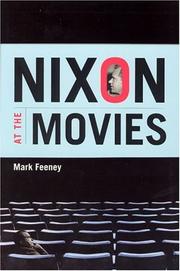
ISBN: 0226239683 9780226239705 0226239705 9780226239682 1283078333 9781283078337 9786613078339 6613078336 Year: 2004 Publisher: Chicago London University of Chicago Press
Abstract | Keywords | Export | Availability | Bookmark
 Loading...
Loading...Choose an application
- Reference Manager
- EndNote
- RefWorks (Direct export to RefWorks)
Was it an omen? Richard Nixon and the film industry arrived in Southern California in the same year, 1913. As Mark Feeney relates in this unusual and unusually absorbing book, Nixon and the movies have shared a long and complex history. Some of that history-the president's multiple screenings of Patton before and during the invasion of Cambodia, or Oliver Stone's Nixon-is well known. Yet much more is not. How many are aware, for example, that Nixon was an enthusiastic filmgoer who watched more than five hundred movies during his presidency?Nixon at the Movies
Motion pictures -- Social aspects -- United States. --- Motion pictures - Social aspects - United States. --- Motion pictures -- United States -- History -- 20th century. --- Motion pictures -- United States -- Psychological aspects. --- Motion pictures - United States - Psychological aspects. --- Nixon, Richard M. (Richard Milhous), 1913-1994 -- Psychology. --- Nixon, Richard M. --(Richard Milhous), --1913-1994 --Psychology. --- Nixon, Richard M. --(Richard Milhous), --1913-1994. --- Presidents -- United States -- Biography. --- Presidents - United States - Biography. --- Presidents --- Motion pictures --- Regions & Countries - Americas --- History & Archaeology --- United States - General --- Social aspects --- Psychological aspects --- History --- Nixon, Richard M. --- Psychology. --- Nixon, Richard Milhous --- Psychology --- Views on motion pictures --- United States --- Biography --- History and criticism --- 20th century
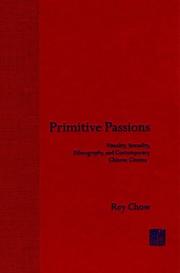
ISBN: 0231076835 0231076827 Year: 1995 Volume: *2 Publisher: New York (N.Y.): Columbia university press
Abstract | Keywords | Export | Availability | Bookmark
 Loading...
Loading...Choose an application
- Reference Manager
- EndNote
- RefWorks (Direct export to RefWorks)
S17/2000 --- 791.43 --- China: Art and archaeology--Film --- Filmkunst. Films. Cinema --- Motion pictures --- China. --- 791.43 Filmkunst. Films. Cinema --- Cinema --- Feature films --- Films --- Movies --- Moving-pictures --- Audio-visual materials --- Mass media --- Performing arts --- China --- History and criticism --- Social aspects --- Motion pictures - China. --- Motion pictures - Social aspects - China. --- Sociology of culture --- Film
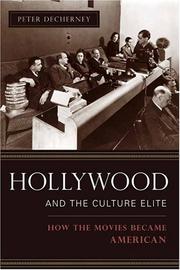
ISBN: 0231133766 9780231133777 0231133774 0231508514 9780231133760 Year: 2005 Volume: *9 Publisher: New York : Columbia University Press,
Abstract | Keywords | Export | Availability | Bookmark
 Loading...
Loading...Choose an application
- Reference Manager
- EndNote
- RefWorks (Direct export to RefWorks)
As Americans flocked to the movies during the first part of the twentieth century, the guardians of culture grew worried about their diminishing influence on American art, education, and American identity itself. Meanwhile, Hollywood studio heads were eager to stabilize their industry, solidify their place in mainstream society, and expand their new but tenuous hold on American popular culture. Peter Decherney explores how these needs coalesced and led to the development of a symbiotic relationship between the film industry and America's stewards of high culture. Formed during Hollywood's Golden Age (1915-1960), this unlikely partnership ultimately insured prominent places in American culture for both the movie industry and elite cultural institutions. It redefined Hollywood as an ideal American industry; it made movies an art form instead of simply entertainment for the masses; and it made moviegoing a vital civic institution. For their part, museums and universities used films to maintain their position as quintessential American institutions. As the book delves into the ties between Hollywood bigwigs and various cultural leaders, an intriguing cast of characters emerges, including the poet Vachel Lindsay, film producers Adolph Zukor and Joseph Kennedy, Hollywood flak and censor extraordinaire Will Hays, and philanthropist turned politician Nelson Rockefeller. Decherney considers how Columbia University's film studies program helped integrate Jewish students into American culture while also professionalizing screenwriting. He examines MoMA's career-savvy film curator Iris Barry, a British feminist once dedicated to stemming the tide of U.S. cultural imperialism, who ultimately worked with Hollywood and the U.S. government to fight fascism and communism and promote American values abroad. Other chapters explore Vachel Lindsay's progressive vision of movies as reinvigorating the public sphere through film libraries and museums; the promotion of movie connoisseurship at Harvard and other universities; and how the heir of a railroad magnate bankrolled the American avant-garde film movement. Amid ethnic diversity, the rise of mass entertainment, world war, and the global spread of American culture, Hollywood and cultural institutions worked together to insure their own survival and profitability and to provide a coherent, though shifting, American identity.
Motion picture industry --- Motion pictures --- History --- Social aspects --- United States --- Social life and customs --- #SBIB:309H1313 --- Geschiedenis en/of organisatie van het filmwezen: algemeen en per land (met inbegrip van de rol van het filmwezen in de ontwikkelingsproblematiek) --- 20th century --- Culture in motion pictures --- Culture in motion pictures. --- History. --- Motion picture industry - United States - History --- Motion pictures - United States - History --- Motion pictures - Social aspects - United States --- United States - Social life and customs - 20th century
Book
ISBN: 9780231173575 9780231173568 9780231539388 023153938X 0231173571 0231173563 9781336146075 1336146079 Year: 2015 Volume: *13 Publisher: New York, NY
Abstract | Keywords | Export | Availability | Bookmark
 Loading...
Loading...Choose an application
- Reference Manager
- EndNote
- RefWorks (Direct export to RefWorks)
Is a film watched on a video screen still cinema? Have digital compositing, motion capture, and other advanced technologies remade or obliterated the craft? Rooted in their hypothesis of the "double birth of media," André Gaudreault and Philippe Marion take a positive look at cinema's ongoing digital revolution and reaffirm its central place in a rapidly expanding media landscape. The authors begin with an overview of the extreme positions held by opposing camps in the debate over cinema: the "digitalphobes" who lament the implosion of cinema and the "digitalphiles" who celebrate its new, vital incarnation. Throughout, they remind readers that cinema has never been a static medium but a series of processes and transformations powering a dynamic art. From their perspective, the digital revolution is the eighth major crisis in the history of motion pictures, with more disruptions to come. Brokering a peace among all sides, Gaudreault and Marion emphasize the cultural practice of cinema over rigid claims on its identity, moving toward a common conception of cinema to better understand where it is headed next.
Motion pictures --- Digital media. --- Cinéma --- Médias numériques --- Philosophy. --- Technological innovations. --- Social aspects. --- Philosophie --- Innovations --- Aspect social --- Digital media --- Philosophy --- Technological innovations --- Social aspects --- Cinéma --- Médias numériques --- Film --- Music, Dance, Drama & Film --- Electronic media --- New media (Digital media) --- Mass media --- Digital communications --- Online journalism --- Cinema --- Feature films --- Films --- Movies --- Moving-pictures --- Audio-visual materials --- Performing arts --- History and criticism --- Motion pictures - Philosophy --- Motion pictures - Technological innovations --- Motion pictures - Social aspects

ISBN: 0810811065 9780810811065 Year: 1978 Publisher: Metuchen (N.Y.) Scarecrow
Abstract | Keywords | Export | Availability | Bookmark
 Loading...
Loading...Choose an application
- Reference Manager
- EndNote
- RefWorks (Direct export to RefWorks)
Bioscooppubliek --- Film audiences --- Motion picture audiences --- Public de cinéma --- Motion pictures --- Cinéma --- Social aspects. --- Psychological aspects. --- Aspect social --- Aspect psychologique --- Social aspects --- Psychological aspects --- -Motion pictures --- -#SBIB:309H525 --- #SBIB:309H526 --- #SBIB:309H1320 --- #SBIB:AANKOOP --- #SBIB:309H1328 --- Cinema --- Feature films --- Films --- Movies --- Moving-pictures --- Audio-visual materials --- Mass media --- Performing arts --- Sociologie van de audiovisuele boodschap --- Psychologie van de audiovisuele boodschap --- De filmische boodschap: algemene werken (met inbegrip van algemeen filmhistorische werken en filmhistorische werken per land) --- Films met een ideologische en spiegelfunctie --- History and criticism --- Cinéma --- #SBIB:309H525 --- Motion pictures - Social aspects --- Motion pictures - Psychological aspects
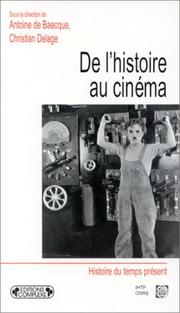
ISBN: 2870277059 9782870277058 Year: 1998 Volume: *1 Publisher: Bruxelles : Editions Complexe,
Abstract | Keywords | Export | Availability | Bookmark
 Loading...
Loading...Choose an application
- Reference Manager
- EndNote
- RefWorks (Direct export to RefWorks)
Films --- Films cinématographiques --- Geschiedenis --- Histoire --- Motion pictures and history --- Cinéma et histoire --- Motion pictures --- Social aspects --- History --- #SBIB:309H1320 --- film --- geschiedenis --- film en geschiedenis --- Antonioni Michelangelo --- Renoir Jean --- holocaust --- 791.41 --- -Motion pictures --- -Cinema --- Feature films --- Movies --- Moving-pictures --- Audio-visual materials --- Mass media --- Performing arts --- De filmische boodschap: algemene werken (met inbegrip van algemeen filmhistorische werken en filmhistorische werken per land) --- History and criticism --- History. --- Social aspects. --- -De filmische boodschap: algemene werken (met inbegrip van algemeen filmhistorische werken en filmhistorische werken per land) --- Cinéma et histoire --- Motion pictures - Social aspects --- Motion pictures - History --- CINEMA --- CINEMA ET HISTOIRE --- FILMS HISTORIQUES --- HISTOIRE ET CRITIQUE --- HISTORIOGRAPHIE
Book
ISBN: 9782873402730 9782870377079 287037707X 2873402733 Year: 2011 Volume: *18 Publisher: Namur : Crisnée : Presses universitaires de Namur Yellow Now,
Abstract | Keywords | Export | Availability | Bookmark
 Loading...
Loading...Choose an application
- Reference Manager
- EndNote
- RefWorks (Direct export to RefWorks)
Contributions et transcription du débat à une journée d'étude de 2009 sur les représentations des crises économiques au cinéma depuis les années 1930 et sur les constructions mentales et identitaires que véhiculent ces films.
Social problems in motion pictures --- Depressions --- Motion pictures --- Problèmes sociaux au cinéma --- Crises économiques --- Cinéma --- Plots, themes, etc --- Intrigues, thèmes, etc --- Depressions in motion pictures --- Social aspects --- Depressions in motion pictures. --- Plots, themes, etc. --- Problèmes sociaux au cinéma --- Crises économiques --- Cinéma --- Intrigues, thèmes, etc --- Cinema --- Feature films --- Films --- Movies --- Moving-pictures --- Audio-visual materials --- Mass media --- Performing arts --- Motion picture plays --- Motion picture plots --- Plots (Drama, novel, etc.) --- Film genres --- History and criticism --- Themes, motives --- Belgium --- Wallonia (Belgium) --- In motion pictures --- Film --- Wallonia --- Motion pictures - Social aspects - Belgium - Wallonia --- Motion pictures - Plots, themes, etc --- Belgique --- Wallonie (Belgique) --- Thèmes, motifs --- Au cinéma
| Listing 1 - 10 of 11 | << page >> |
Sort by
|

 Search
Search Feedback
Feedback About UniCat
About UniCat  Help
Help News
News